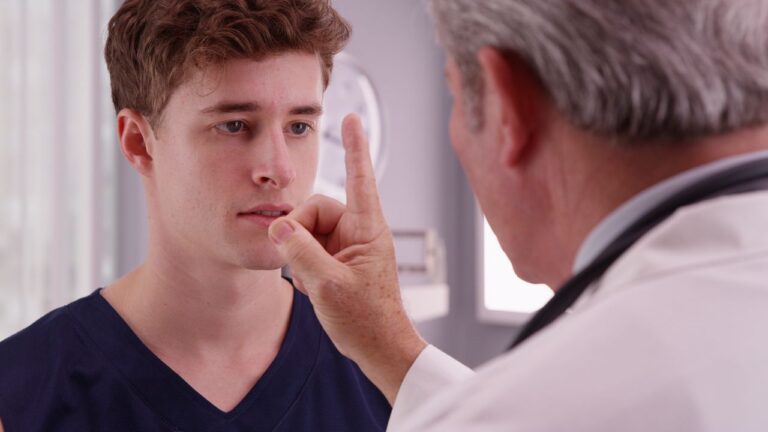Do I Have A Concussion? An Interactive Quiz
Finding the Right Care
If you suspect you’ve recently sustained a concussion, you’re in the right place. This article will outline some common concussion symptoms and provide an interactive quiz to help you figure out if you’ve sustained an injury. It will break down your symptoms into categories to help you identify what specialized care is needed.
If you want to jump straight to the quiz, click here. Below is a summary of the standard systems involved following a concussion.
1. Autonomic Dysfunction: Navigating the Body’s Internal Compass
Autonomic dysfunction can disrupt the body’s automatic functions, affecting heart rate, blood pressure, and temperature regulation. Managing autonomic dysfunction after a concussion requires a comprehensive approach, including lifestyle changes and a multi-disciplined evaluation to identify affected areas.
Treatment for autonomic issues varies depending on the source of the dysfunction. Qualified autonomic specialists and integrated concussion clinics serve as a good first step to identifying underlying issues.
2. Cervical Injury: Restoring Balance in the Neck and Spine
Cervical injuries, often associated with concussions, require specialized care to address neck pain, headaches, and cognitive challenges caused by musculoskeletal imbalances. The journey to recovery involves working closely with healthcare professionals, following customized physical therapy routines, and adopting ergonomic practices to support the cervical spine.
An excellent first step is ensuring nothing is structurally wrong with the neck. This is done with your primary care provider.
After ruling out these more concerning issues, consider seeking relief from neck pain and headaches from physical therapists, chiropractors, or massage therapists.
3. Vestibular Issues: Finding Equilibrium Amidst Uncertainty
Vestibular issues can affect a person’s balance, coordination, and spatial awareness. Symptoms may include vertigo, dizziness, and visual disturbances. Vestibular rehabilitation therapy is a vital part of treatment, involving balance exercises, gaze stabilization techniques, and integration protocols.
Working with specialists to develop a personalized rehabilitation plan and staying committed to the process can help individuals regain their Balance and stability after a concussion. It is essential to distinguish whether the issue is peripheral or central.
This means identifying if it is a problem with the organ system (peripheral) or an issue with the vestibular input matching with other inputs from the eyes and neck (central.) PT is great for peripheral matters, and functional neurology is a better approach for central issues.
4. Oculomotor Issues: Nurturing the Window to the World
Oculomotor issues can affect eye movements, visual tracking, and convergence abilities. This makes daily tasks and visual functions difficult after a concussion. Using vision therapy, eye exercises, and innovative technologies to improve oculomotor function can help people enhance their visual performance and reduce eye strain.
Similar to vestibular issues, it’s important to distinguish between peripheral and central ocular issues. This means identifying if the problem is with the eyes themselves (peripheral) or an integration issue with the other primary sensory systems (central).
Eye doctors are better equipped to treat peripheral matters, while functional neurology providers are better equipped to treat central problems.
5. Cognitive Challenges: Fostering Mental Clarity and Resilience
After a concussion, people may have difficulties with memory, attention, processing speed, and executive functions. These challenges can affect their daily activities and overall quality of life. Cognitive rehabilitation, neurocognitive training, and cognitive-behavioral therapy can provide personalized strategies to improve cognitive function and mental clarity after a concussion.
Structured routines, memory aids, and cognitive exercises can help individuals strengthen their cognitive resilience and progress through cognitive recovery. It’s important to rule out any damage to the brain itself, which is done through your primary care provider.
After this, working with cognitive rehabilitation programs is an excellent next step to identify specific brain regions affected by the concussion.
6. Emotional Disturbances: Cultivating Emotional Well-Being and Support
After a concussion, people may experience emotional changes like mood swings, anxiety, depression, and irritability. This shows how head injuries can affect mental health. It’s essential to focus on mental health, seek counseling, practice mindfulness, and build a supportive network to address these emotional changes after a concussion.
Working with a mental health professional to improve coping skills is one way to support mental health during recovery. Mental issues are often a secondary symptom to other underlying post-concussion issues.
Addressing the different aspects listed above can also accelerate improvements in mood and overall effect following a concussion.
Concussions Aren’t Straight Forward
Finding the right treatments following a concussion can be a confusing process. We hope this article and quiz will help you hone in on the most appropriate forms of treatment needed based on your symptoms.
Using the right tools to find care early on is essential, and the road to recovery is often one good decision away.
If you have further questions regarding the correct type of care, contact The Neural Connection and request a consultation with one of our doctors.
*Note: The information provided in this article is for educational purposes only and does not constitute a doctor-patient relationship. Patients are advised to consult their medical provider or primary care physician before trying any remedies or therapies at home.

